Posters
Here you can find recent selected posters from UKHSA's Culture Collections and collaborators.![]()
![]()
2023:
 Characterisation of the monocyte-like THP1 cell line response to hypoxia pathway activation in vitro
Characterisation of the monocyte-like THP1 cell line response to hypoxia pathway activation in vitro
Monocytes play key roles in human health and disease, with their importance in human lung fibrosis having recently been identified. However, this remains poorly characterised, with some evidence to suggest that this may be a consequence of hypoxia inducible factor (HIF) pathway activation.
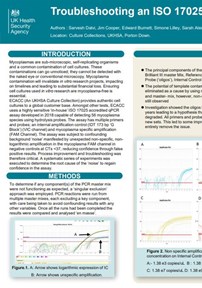 Troubleshooting an ISO 17025 accredited mycoplasma qPCR detection assay.
Troubleshooting an ISO 17025 accredited mycoplasma qPCR detection assay.
Mycoplasmas are sub-microscopic, self-replicating organisms and a common contamination of cell cultures. These contaminations can go unnoticed; they cannot be detected with the naked eye or conventional microscopy. Mycoplasma contamination will invalidate in vitro research projects, impacting on timelines and leading to substantial financial loss. Ensuring cell cultures used in vitro research are mycoplasma-free is essential.
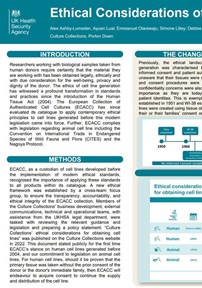
Ethical Considerations of Historically Generated Cell Lines
Researchers working with biological samples taken from human donors require certainty that the material they are working with has been obtained legally, ethically and with due consideration for the well-being, privacy and dignity of the donor.
2019:
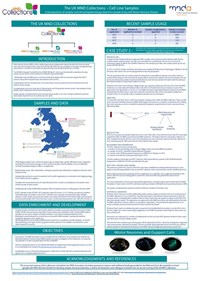 MND Collections Biobank of the Year Award Application
MND Collections Biobank of the Year Award Application
The UK MND Collections is a biorepository of samples and clinical/epidemiology data from people living with Motor Neurone Disease and evolved from the UK MND DNA Bank which is an internationally recognised and unique resource set up in 2003 to assist researchers in finding the cause behind MND. Following the production of this poster, the MND Collections won the award for UK BioBank of the Year 2019.
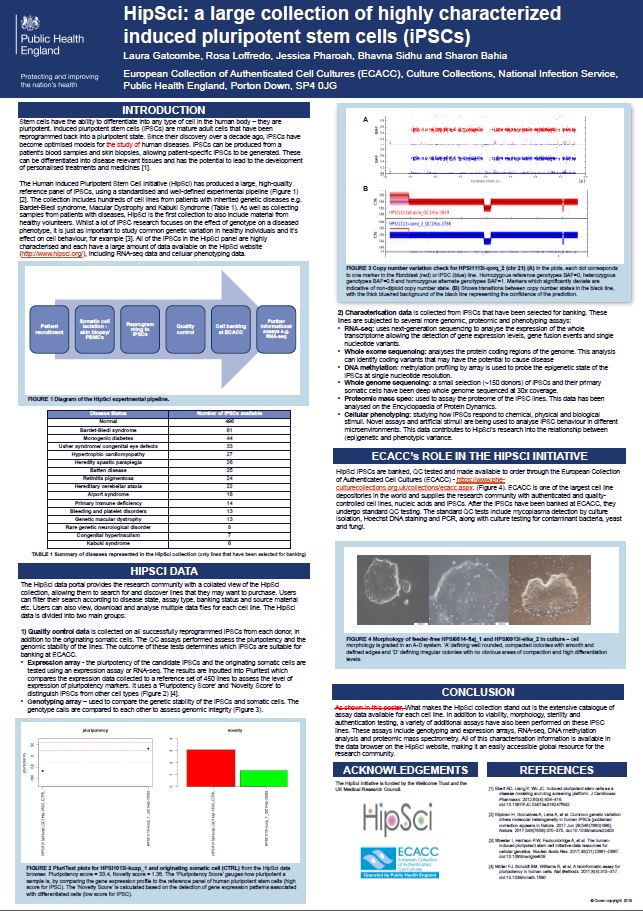
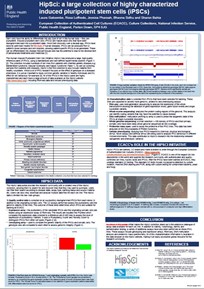 HipSci: a large collection of highly characterised induced pluripotent stem cells (iPSCs)
HipSci: a large collection of highly characterised induced pluripotent stem cells (iPSCs)
The Human Induced Pluripotent Stem Cell Initiative (HipSci) has produced a large, high-quality reference panel of iPSCs, using a standardised and well-defined experimental pipeline. The collection includes hundreds of cell lines from patients with inherited genetic diseases e.g. Bardet-Biedl syndrome, Macular Dystrophy and Kabuki Syndrome.
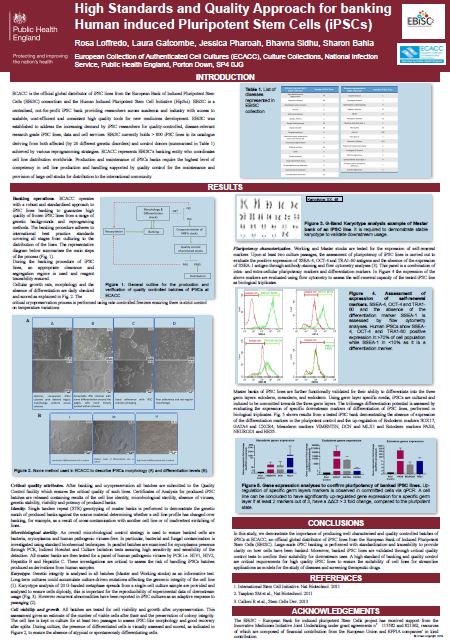
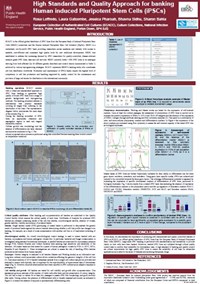 High standards and quality approach for banking human induced pluripotent stems cells (iPSCs)
High standards and quality approach for banking human induced pluripotent stems cells (iPSCs)
This study demonstrates the importance of producing well characterised and quality controlled batches of iPSCs at ECACC, an official global distributor of iPSC lines from the European Bank of Induced Pluripotent Stem Cells (EBISC). Large-scale iPSC banking is performed with standardization and traceability to provide clarity on how cells have been banked. Moreover, banked iPSC lines are validated through critical quality control tests to confirm their suitability for downstream uses.
2023:
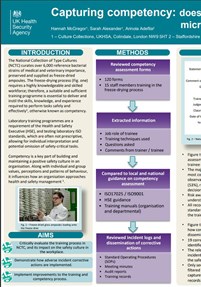
Capturing competency: does the laboratory training approach impact the safety culture of a
microbiology laboratory?
The National Collection of Type Cultures (NCTC) curates over 6,000 reference bacterial strains of medical and veterinary importance, preserved and supplied as freeze-dried ampoules.
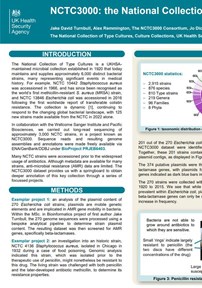 NCTC3000: the National Collection of Type Cultures as a key resource for AMR research
NCTC3000: the National Collection of Type Cultures as a key resource for AMR research
The National Collection of Type Cultures is a UKHSA maintained microbial collection established in 1920 that today maintains and supplies approximately 6,000 distinct bacterial strains, many representing significant events in medical history.
2019:
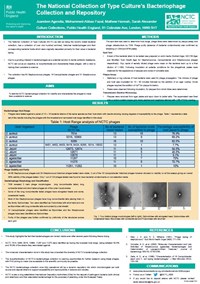 NCTC's bacteriophage collection and repository
NCTC's bacteriophage collection and repository
Due to a growing interest in bacteriophages as a potential solution to tackle antibiotic resistance, NCTC set out as an objective, to re-authenticate and characterise these phages with a view to making them available to science.
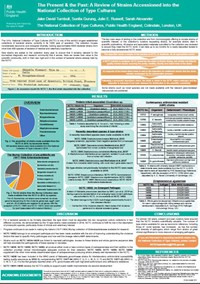 A review of strains accessioned into NCTC
A review of strains accessioned into NCTC
For almost 100 years, present and past curators have ensured that the NCTC remains scientifically valuable. The number of type strains available for use as taxonomic reference, including those of novel species, has increased, as has the number and diversity of pathogens which range from strains of great clinical significance to more obscure or emerging pathogens.
2018:
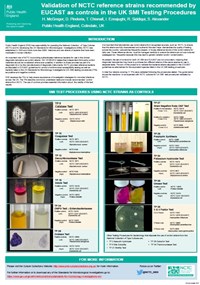 Validation of NCTC reference strains recommended by EUCAST as controls in the UK SMI testing procedures
Validation of NCTC reference strains recommended by EUCAST as controls in the UK SMI testing procedures
2019:
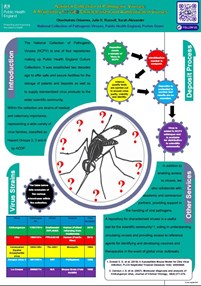
NCPV: A repository for well-characterised and authenticated viruses
The National Collection of Pathogenic Viruses (NCPV) is one of four repositories making up Public Health England Culture Collections. It was established two decades ago to offer safe and secure facilities for the storage of patents and deposits as well as to supply standardized virus products to the wider scientific community.
NCPV 500 an electronic resource for mining viral genomes
NCPV500 is a collaboration between Public Health England and the Wellcome Trust Sanger Institute to produce 500 viral genomes
from PHE’s National Collection of Pathogenic Viruses (NCPV) using the Illumina sequencing platform. NCPV curates and supplies authenticated human pathogenic viruses for the research community.
